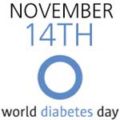Diabetes mellitus is a chronic disease in which the body is not able to correctly process glucose for cell energy due to either an insufficient amount of the hormone insulin or a physical resistance to the insulin the body does produce.
Six basic things you must know about diabetes:
1. It’s not your fault.
Diabetes can be caused by many factors, including being inherited, that means you were born with a tendency to get the disease.
It’s true that specific things can trigger diabetes, including stress, lack of activity and weight gain. But it also means there are things that you can do to make it better and live healthier.
2. Don’t panic!
You may recall about your uncle with diabetes who had his leg amputated or the neighbor who died of a heart attack.
There are things you can do to decrease your risk of these complications.
3. You don’t need special foods.
People usually want to know what they can eat when they go home and worry that they’ll never be able to consume anything sweet again.
You must know that you should eat the same way everyone should eat. That means controlling carbohydrates, portion sizes, fat and salt intake, but also enjoying the occasional sweet treat.
Use diabetes as something that can motivate you and your families to live the healthier lives that all of us should be living.
4. Being active helps.
It doesn’t mean that you have to run a marathon. You need to think about how you can be more active.
If you are not active, little changes can help you start, from taking the stairs instead of the elevator to parking the car at the far end of the lot. Being active has big payoffs, helping you lower glucose levels; strengthen heart, bones and muscles; lose weight; and feel better.
5. Learning to master your diabetes is critical: See a diabetes educator.
Diabetes educators are licensed health care professionals who work with each patient to design a specific healthy living plan tailored to you that includes the tools and support you need.
Diabetes education has been proven to help patients with diabetes manage their weight and reduce their cholesterol levels and blood pressure; and that the diabetes educator acts as part of your team to help the you manage care in a way that makes sense to you.
6. You’re not alone.
It’s important to remember is that a diabetes diagnosis is scary and can be overwhelming, but, you will have to make changes, healthcare providers are there to help you. Get involved with support groups – in person or online.
Finally, you must know that you can manage the disease – Diabetes mellitus.









